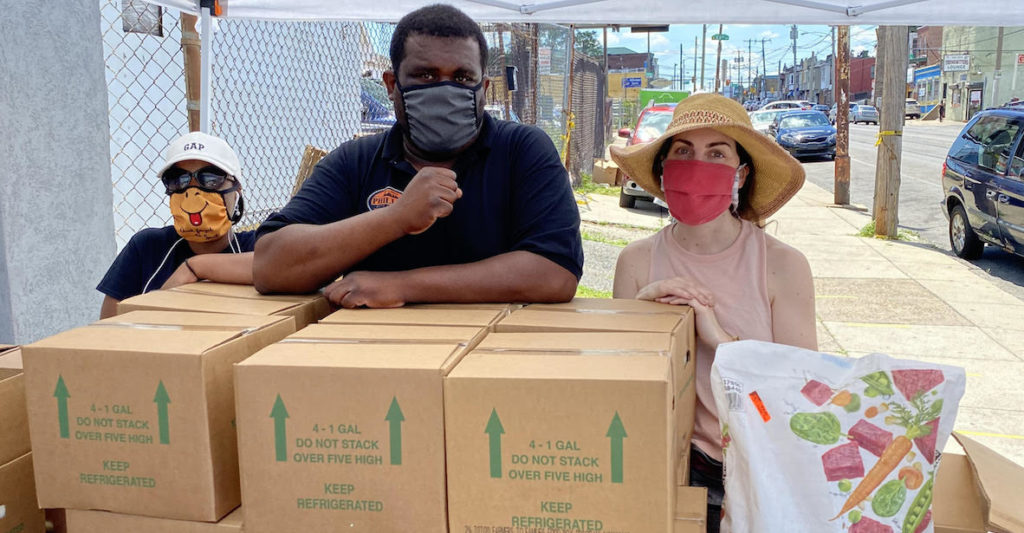In the fall of 2019, Emily Callaghan bumped into Jermaine Womack on a street in West Philadelphia and stopped to greet Stoney, his pet Cane Corso. Callaghan, a proud and longtime owner of her own chihuahua mix, Manny, felt instantly connected to Stoney and Womack, and the neighbors promptly exchanged information.
Womack is best known as the founder of Philly’s Auto and Parole, a reentry program whose primary mission is to provide formerly incarcerated individuals and youth transitioning back into society an opportunity to earn a living wage through courses in automotive repair.
Callaghan is an independent strategy consultant who works with organizations around the U.S., including dozens of nonprofits, on everything from marketing to development. In 2019, she returned to Philly from Uganda, where she’d been doing work for an organization that works on improving the livelihoods of farmers by providing them with resources and opportunities.
It’s only fitting that it’s dogs (and cats) that the two new friends thought of as they felt compelled to help their community through the Covid-19 crisis. Womack had been running an unofficial food pantry out of Auto and Parole using donations and resources from the Share Food Program for a couple of weeks when he and Callaghan realized that if people are in need of food for themselves, they’re likely in need of food for their pets, too.
“Pets are a fact,” Callaghan says. “So for all the people who have them … let’s just help them keep their pets.”
Their grassroots operation started with donations from people Callaghan knew had extra pet food and supplies. “I would bring it to Jermaine’s shop, he would put out a post on social media saying what he had, and people would bring their dog and pick up a huge thing of dog food or cat food or litter or whatever it was,” she says. “Ultimately, we saw that the need was much greater.”
“People deserve to have relationships with their pets,” Callaghan says. “If you don’t have money, you just lost your job, you don’t want to have to give up your dog or your cat, too.”
So Callaghan reached out to pet food organizations and shops to explain what the partners had in mind. And suppliers rallied behind them: Philadelphia Animal Welfare Society, Providence Animal Center, Aldi, Pennsylvania Society for the Prevention of Cruelty to Animals, Citizens for a No-Kill Philadelphia, BONeJOUR Pet Supply, and Baltimore Pet Shoppe were among the donors who immediately stepped up to help.
Since March, the two have acquired enough food to provide for almost 500 people and pets who have found themselves in need in light of the Covid-19 crisis.
One Tuesday in July, Devoe Taylor was among the locals who visited the pantry, at the corner of Lindenwood Street and Woodland Avenue, for the third time in three weeks. He stood in line in a taped-off area, six feet apart from hundreds of other neighbors, and was greeted by a series of familiar and friendly faces.
Though food pantries are plentiful in our region, food pantries for animals are less common. There is Sam’s Hope, which delivers pet food to home-bound Philadelphians, as well as Henry’s Helping Paws and Providence Animal Center. But Womack and Callaghan wanted to open up the possibilities and provide even more resources.
As dog owners, Womack and Callaghan know the importance of having resources for animal companions, and recognize the deep joy a pet can bring to a household, especially in quarantine. People with pets have been proven to have reduced reports of stress and loneliness, according to a study by the Harvard Medical School.
Having pets creates healthier communities, and community is the beating heart of the passion Womack and Callaghan bring to all of their work. When they’re not at the pantry, they spend their time connecting to the community through other measures: Womack provides masks to essential workers at a local hospital, and continues to provide youth and adults recovering from experiences with the criminal justice system.
Callaghan helps people find resources for their animals—how to get them spayed, neutered and more. She also works with a national program called Pets for Life and is working on launching a similar operation in Philadelphia in order to keep pets and families together. “People deserve to have relationships with their pets,” she says.
In this time of uncertainty and crisis, Callaghan and Womack are committed, like so many other Philadelphians rising to the challenge, to recognizing the kinds of emotional needs of the community that often go overlooked. “If you don’t have money, you just lost your job, you don’t want to have to give up your dog or your cat too,” Callaghan says.
“The community really needs these services,” says Taylor. “And we’re really fortunate to have these guys.”

